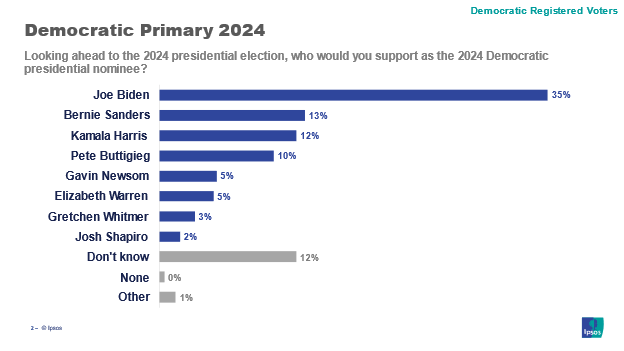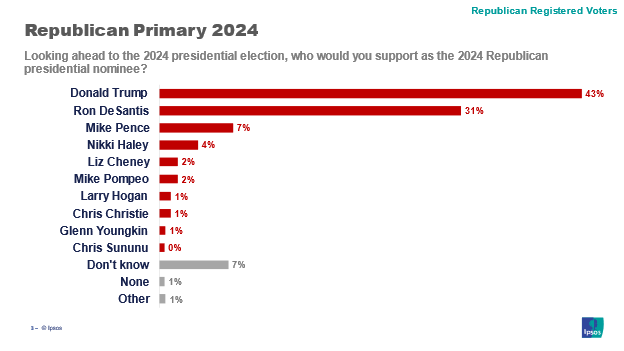Trump leads the Republican Primary field; Biden leads the Democrats
Washington, DC, February 15, 2023– Reuters/Ipsos have begun tracking sentiments of the American public ahead of the 2024 presidential primaries. Our first survey on the topic shows former President Donald Trump receiving the largest amount of support from Republican registered voters, and President Joe Biden receiving the most support from Democratic registered voters, but Biden's support is softer than Trump's. The survey also looked at other issues, including the debt ceiling, perceptions of Ukraine, and university admissions considerations.
Detailed Findings
Among Democratic registered voters, President Biden leads the pack (35%), followed by Bernie Sanders (13%), Kamala Harris (12%), and Pete Buttigieg (10%). When Joe Biden is excluded from the ballot, Harris is the front runner (27%), followed by Sanders (18%) and Buttigieg (15%). Democratic registered voters are most likely to say that having good policy positions (17%) are their main reason for selecting a candidate, followed by caring about people like them (12%), being honest and trustworthy (12%), and having a proven track record (10%).

Among Republican registered voters, former President Trump is the clear front runner (43%), followed by Ron DeSantis (31%). When Donald Trump is excluded from the ballot, Ron DeSantis is the decisive leader (52%), followed distantly by Mike Pence (16%). Nikki Haley, who recently announced her formal bid for the office, receives 5% of the support when Trump is excluded. Republican registered voters say that having good policy positions (23%), a proven track record (20%), and will aggressively protect America (14%) are the most important reasons for supporting their candidate.

The survey also examined matchups between President Joe Biden and potential Republican challengers. Among registered voters, DeSantis (41%) and Biden (38%) are statistically tied, as are Trump (42%) and Biden (39%). Biden (43%) has an edge over Haley (31%). In a three-way race between Biden, Trump and Liz Cheney, Trump (39%) has the lead over Biden (32%) and Cheney (15%).
When asked about the debt ceiling, 17% of Americans say they have heard a great deal about the debt ceiling debate. Perceptions of raising the debt ceiling are split, with 32% of Americans saying they favor raising it, 35% oppose raising it, and 33% say they are not sure. Among those who say they have heard/read/seen a great deal about the debt ceiling, 56% are in favor of raising it, 34% oppose raising it, and 10% don’t know. Americans are concerned about the impact of not raising the debt ceiling about the impact it will have on the economy, their family, and inflation. A majority say that the solution is a combination of cutting existing programs and raising taxes (52%). One-third say the solution should be to only cut programs (33%) and 15% say the solution should be to raise taxes.
When asked about Ukraine, 42% of Americans approve of how Biden is handling Ukraine and 63% of Americans say the U.S. must support democratic countries when they are attacked by non-democratic countries. A majority say (58%) say the U.S. should provide weapons to Ukraine.
When asked about university admissions, 67% of Americans say college admissions should only be based on merit, while a majority of Americans say they support programs aimed at increasing racial diversity (58%). Americans say that race should not be considered during the college admissions process (62%), followed by legacy admissions (56%), socioeconomic background (48%), and whether someone is the first to attend college in the family (46%). Thirty-seven percent of Americans say that athletic ability should not be considered, but 49% say it should be a minor consideration.
About the Study
These are some of the findings of an Ipsos poll conducted between February 6-13, 2023 on behalf of Thomson Reuters. For this survey, a sample of 4,408 adults age 18+ from the continental U.S., Alaska, and Hawaii was interviewed online in English. The sample includes 3,660 registered voters, 1,786 Democratic registered voters, and 1,465 Republican registered voters.
The sample was randomly drawn from Ipsos’ online panel, partner online panel sources, and “river” sampling and does not rely on a population frame in the traditional sense. Ipsos uses fixed sample targets, unique to each study, in drawing a sample. After a sample has been obtained from the Ipsos panel, Ipsos calibrates respondent characteristics to be representative of the U.S. Population using standard procedures such as raking-ratio adjustments. The source of these population targets is U.S. Census 2021 American Community Survey data. The sample drawn for this study reflects fixed sample targets on demographics. Posthoc weights were made to the population characteristics on gender, age, race/ethnicity, region, and education.
Statistical margins of error are not applicable to online non-probability polls. All sample surveys and polls may be subject to other sources of error, including but not limited to coverage error and measurement error. Where figures do not sum to 100, this is due to the effects of rounding. The precision of Ipsos online polls is measured using a credibility interval. In this case, the poll has a credibility interval of plus or minus 1.8 percentage points for all respondents. Ipsos calculates a design effect (DEFF) for each study based on the variation of the weights, following the formula of Kish (1965). This study had a credibility interval adjusted for design effect of the following (n=4,408, DEFF=1.5, adjusted Confidence Interval=+/-3.3 percentage points).
The poll also has a credibility interval of plus or minus 2.0 percentage points for registered voters, plus or minus 2.8 percentage points for Democratic registered voters, and plus or minus 2.8 percentage points for Republican registered voters.
For more information on this news release, please contact:
Chris Jackson
Senior Vice President, US
Public Affairs
+1 202 420-2025
[email protected]
Annaleise Lohr
Director, US
Public Affairs
[email protected]
About Ipsos
Ipsos is one of the largest market research and polling companies globally, operating in 90 markets and employing over 18,000 people.
Our passionately curious research professionals, analysts and scientists have built unique multi-specialist capabilities that provide true understanding and powerful insights into the actions, opinions and motivations of citizens, consumers, patients, customers or employees. Our 75 solutions are based on primary data from our surveys, social media monitoring, and qualitative or observational techniques.
Founded in France in 1975, Ipsos is listed on the Euronext Paris since July 1st, 1999. The company is part of the SBF 120 and the Mid-60 index and is eligible for the Deferred Settlement Service (SRD).
ISIN code FR0000073298, Reuters ISOS.PA, Bloomberg IPS:
FP www.ipsos.com



